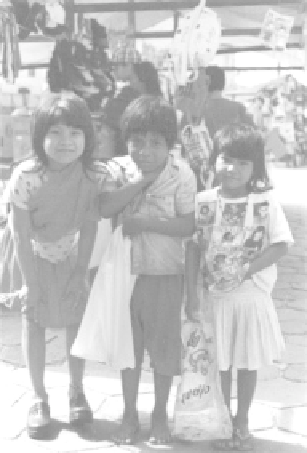Geography Reference
In-Depth Information
ones have
cafézinho
, a shot of watery coffee loaded with sugar; eventually, when the
families can pick up old bread from the local bakeries on Sundays, the kids suck on
dry bread dipped in coffee. This is considered “good food” (
comida boa
). The adults
expect the kids to help them collect scraps of food at the dump on Tuesdays, Thursdays,
and Saturdays, when the trucks bring garbage from Mongaguá and other nearby cities,
and at street markets on Fridays and Sundays. When the adults have something to sell
at the street markets, such as hearts of palm or orchids, the children are expected to
find or beg for food and money. On different occasions, I witnessed Guarani children
running back to Itaóca with empty bags, explaining to me that they were going back to
try to set up a trap for birds and small animals, such as armadillos, because
a gente não
gosta, de comer comida do lixo
(we don't like to eat food from the garbage).
Figure 3.7. Guarani kids at the street market in Mongaguá, 1999.
Most Guarani children thus refuse to follow their parents to the dump, and scavenge
amidst piles of rotting rubbish, twisted metal pieces, and broken glass. Those kids
who cannot escape what most adults see as inevitable fate - because suffering is part
of the ascetic lifestyle necessary to migrate to the Land-without-Evil - try to get the
best out of the rest: sling shots and small bows and arrows are especially carved to
fight off the vultures and horses that also compete for food at the dumpsite. Once
mining grounds are clear, the kids pull out special scavenging hooks to minimize
the risk of sharp cuts and wounds. Most infected lesions the Guarani carry on their
bodies are inflicted at the dump. Tetanus is a major cause of death for children and
adults alike.

